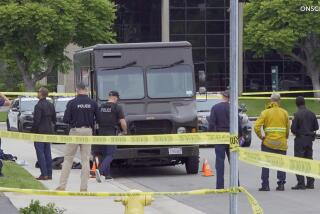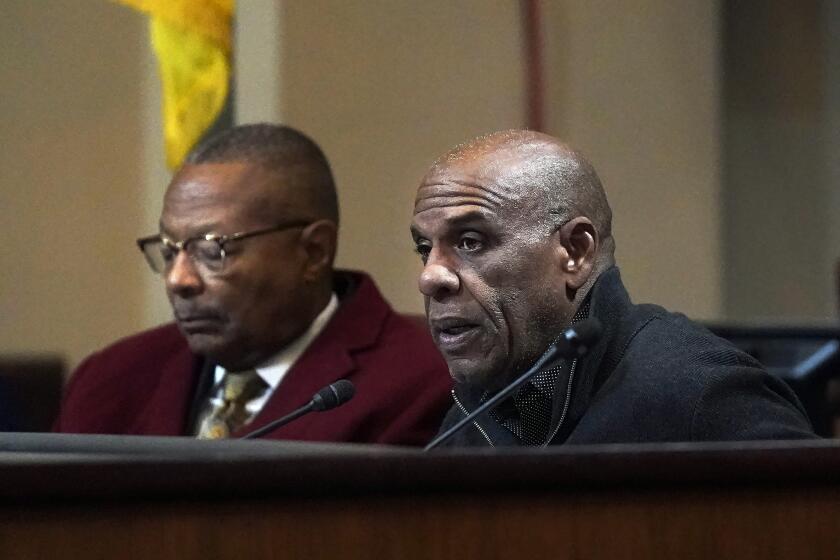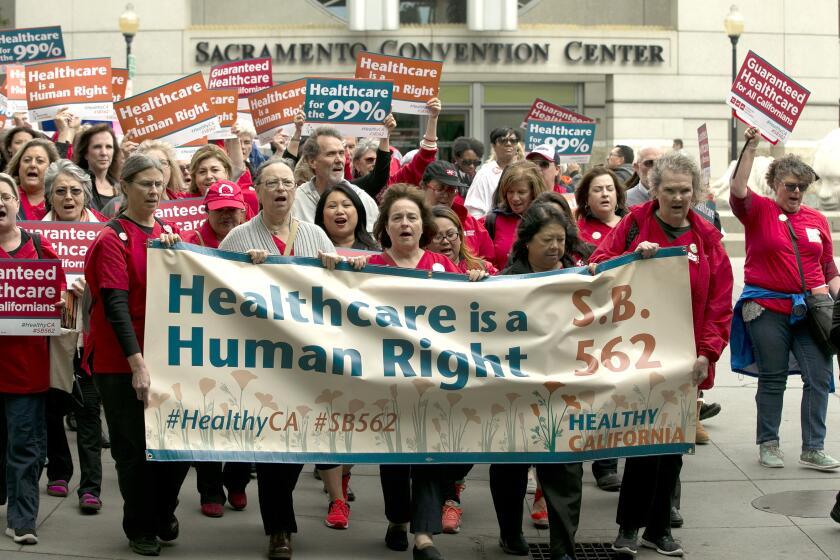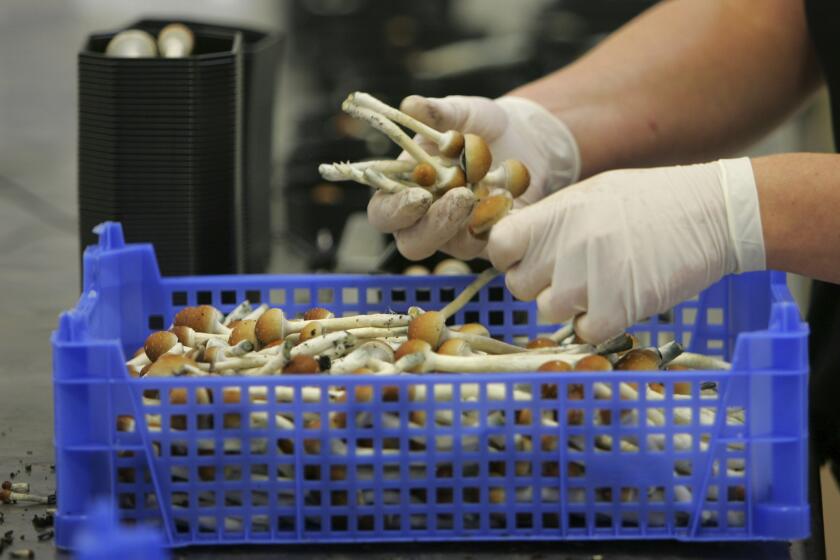‘No More Mr. Nice Guy,’ Tax Board Warns Cheats
For the guilt-ridden, tax amnesty was an opportunity to clear consciences. For tax cheats, it was a chance to avoid penalties and prosecution. For the tax collector, it was a big success.
During California’s tax amnesty program that ended March 15, more than 130,000 people turned themselves in for evading various state taxes in past years. State workers are still counting receipts from the four-month project, but officials say the total taken in could exceed $150 million.
Now, however, the state says it is no more Mr. Nice Guy. Tax officials are launching a major crackdown on tax cheating, which they hope will make the amnesty program look like a small-time operation.
“I don’t think people realize we’re ready to come forward with new ways of catching people,” said Will Bush, a spokesman for the Franchise Tax Board. “A lot of those people are in for a surprise.”
Officials said tax cheating robs the state of $2 billion each year and unfairly shifts the tax burden onto honest citizens.
California will step up its efforts to collect more of that money, using a sophisticated new computer system, tougher penalties and increased cooperation among state and local agencies.
Improper Reporting
In particular, the state will begin ferreting out unreported real estate transactions and tracking down improper income reporting by taxpayers who are self-employed.
The government is also ready to revoke the licenses of contractors and other business people who pay employees in cash, without keeping proper records.
“We’re going to get to those people that didn’t come to us,” Bush said.
Some tax cheaters who received amnesty from the state may be in for a surprise if they did not realize that their returns will be turned over to the federal Internal Revenue Service for further scrutiny. The IRS is not bound by California’s promise of amnesty.
“We will run a computer scan on all of them and decide which deserve to be investigated,” said IRS spokeswoman Connie Hough. “People may be subject to additional taxes and civil penalties.”
The confessions of those who received amnesty will provide valuable assistance to the state’s new crackdown. Officials will study their returns in an effort to find weaknesses in the tax-collection system.
“The information is going to tell us where we were missing the boat,” Bush said. “It’s going to tell us where the holes were.”
The amnesty program was approved by the Legislature in 1983 as the first of what Bush called a “carrot-and-stick approach” to collecting unpaid taxes.
During the amnesty that ran from Dec. 10, 1984, through March 15, errant taxpayers were encouraged to seek amnesty, confess their past mistakes and pay up without the threat of penalties.
“Get to us before we get to you” was the program’s slogan.
Still Climbing
Officials initially estimated that the amnesty would bring in $66 million. As of last week, however, the total reached $133 million and was still climbing, as workers sorted through a last-minute deluge of returns.
Some taxpayers took advantage of the amnesty to resolve ongoing disputes with tax officials, said Sid Mandel, a Board of Equalization spokesman.
One of the last-minute payments was a $1.3-million check sent in by a Southern California computer firm that finally decided to pay what it owed in sales tax payments, he said.
A bank that bought a company jet airplane for more than $2 million had disputed that it was taxable. However, just before the amnesty ended, the bank agreed to pay its $128,700 tax bill.
But many payments were also from individuals plagued by guilt for years over small infractions, Mandel said.
One woman, who had under-reported the value of a used car she purchased, sent the Board of Equalization a $150 check to cover the additional sales tax she owed. In an accompanying letter she said:
“I am sure my check is considerably more than is due, but I just have to get rid of the whole business so I can feel right with myself. Believe me--never before and never again. Thank you for this opportunity to get squared away.”
When the Legislature authorized the amnesty program, it also approved tougher penalties and a new approach to enforcement that will take effect now.
“Traditionally, we’ve always hit hard on the audit,” Bush explained. “But the tax gap has grown in other areas: among the self-employed, the failure to report income in the area of investments.
“So what we need to do is find other tools, rather than throw more auditors at the problem. The real important thing here is the use of new computer techniques of information sharing.”
Not Reported
In the past, Bush said, only about 60% of the real estate transactions in the state were reported on tax returns--even though they were properly recorded with local officials.
The state will now use its computer ability to compare tax returns with county records and catch unreported sales. This alone should bring in $30 million in unpaid taxes during the first year, Bush said.
Another part of the crackdown will focus on the under-reported income of the self-employed.
The Franchise Tax Board will attack this problem by using the computer to search through the records of a variety of state and local government agencies to find data indicating how much income the self-employed actually earned.
Tax officials expect the computer to uncover millions of dollars in previously hidden income and recover at least $20 million in taxes the first year.
Pay Cash
The tax board is also planning an assault on businesses that pay cash to employees, without keeping adequate records, Bush said.
In the past, there was no penalty for this offense. Now a fine of $2,500 can be levied for each incident of improper reporting.
In addition, the state now has the power to strip professionals of their state licenses for using cash payments as a way of avoiding taxes.
A primary target will be contractors, but everyone licensed by the state, such as doctors and accountants, is subject to the penalty, Bush said.
Other penalties have also been imposed or increased, including:
- A $5,000 fine for those who assist others in understating their tax liability. Tax accountants or the leaders of tax protest organizations could be subject to this penalty.
- A $500 fine for filing a frivolous return.
- A $500 penalty for each incident of using a resale permit to evade taxes by buying property on the pretense of reselling it and then keeping it.
Yet another aspect of the crackdown will concentrate on abusive tax shelters.
Tax shelter promoters will be required to furnish the state with a list of investors in a shelter found to be improper. Furthermore, the promoter can be fined 10% of the income he received from an abusive shelter or $1,000, whichever is greater.
In addition, the Franchise Tax Board has a plan for tracking down those who have income but pay no state taxes.
The board, Bush said, will begin examining local records to find people who live in expensive homes or have business licenses but file no state returns.
More to Read
Start your day right
Sign up for Essential California for news, features and recommendations from the L.A. Times and beyond in your inbox six days a week.
You may occasionally receive promotional content from the Los Angeles Times.






